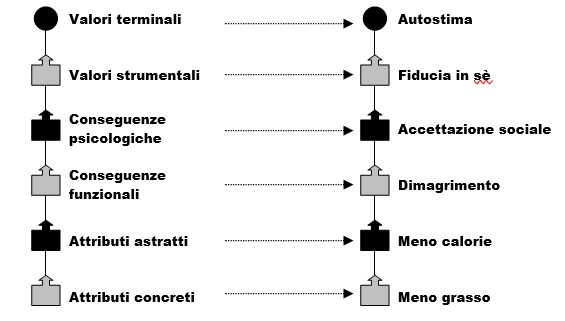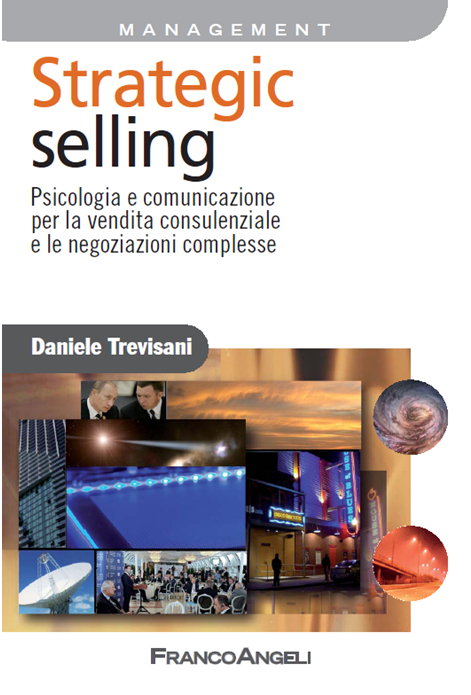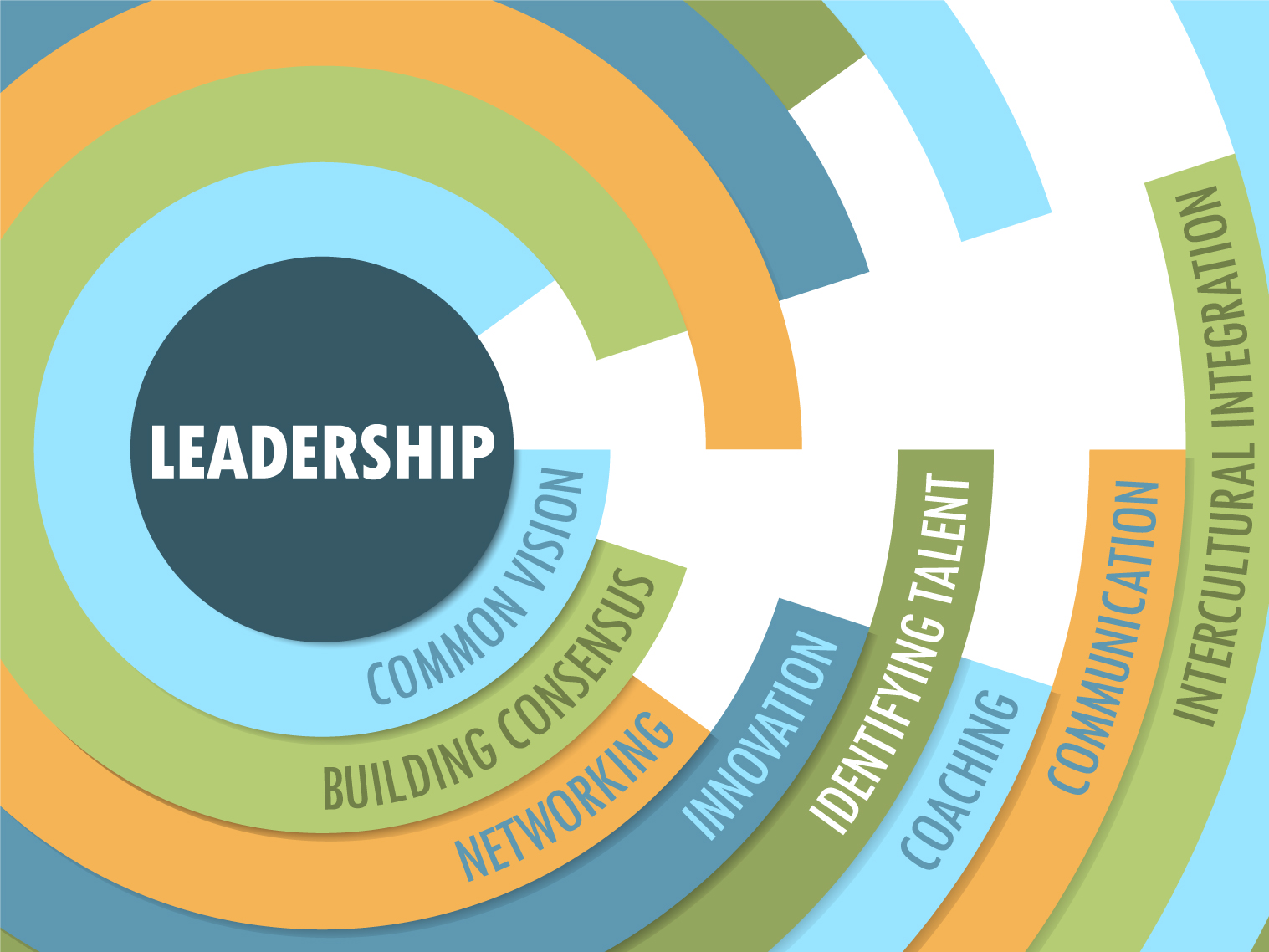© Articolo estratto con il permesso dell’autore, Dott. Daniele Trevisani dal libro “Ascolto Attivo ed Empatia. I segreti di una comunicazione efficace. Milano, Franco Angeli
__________
Nell’articolo di oggi parleremo delle “Means-End Chains“, o “catene mezzi-fini“, strategia che ha l’intento di scavare a fondo nel sistema di credenze dell’interlocutore per poter comprendere le motivazioni che si nascondono dietro alle parole, ai comportamenti e agli atteggiamenti.
Le convinzioni sono il motore del comportamento. Le convinzioni, o credenze, possono essere utili (es, se mangio frutta e verdura mi farà bene) o letali (es, vado forte in auto tanto a me non succederà niente).
Ascoltare le credenze significa setacciare l’ascolto andando alla ricerca delle convinzioni (beliefs, credenze radicate o periferiche) di cui la persona è portatrice. Le credenze sono in parte consce, ma in larga parte inconsce e non espresse, non verbalizzate.
Come un vento vorticoso, le credenze attorniano le persone e non gli offrono spazio per guardare oltre. Se guardo una persona sollevare un attrezzo (un peso), penso che non abbia altro da fare che farsi del male, o cerco di comprendere e capire perché lo fa. Molto probabilmente quel gesto meccanico, nella sua visione delle cose, ha il fine di stimolare il muscolo, bruciare grassi, ottenere migliore forma fisica e quindi piacere di più, fino ad auto-accettarsi di più. Benvenuti, siamo in una palestra. Adesso quel gesto fisico assume un senso, o almeno una parte del senso totale. Difficilmente, però, se chiediamo a questa persona cosa stia facendo, dirà: “voglio essere più seduttivo e auto-realizzato”. Molto più probabilmente risponderà: “sto facendo palestra, per stare in forma”. Possiamo quindi dire che dietro ad ogni parola (mezzo), o azione che osserviamo, esiste un fine che possiamo scoprire. La Means-End Chain (catena mezzi-finalità) è il meccanismo basilare attraverso il quale si crea un valore.
Vediamo un’analisi svolta relativamente al prodotto “yoghurt magro”.

La catena esposta nella figura vede presenti diverse “promesse” (sulla destra), che il cliente percepisce, associate ad altrettanti “stati” del prodotto (sulla sinistra), sino al punto in cui si trasformano in valori.
Notiamo:
- un attributo concreto (concrete attribute: bassa percentuale di grasso);
- un attributo più intangibile e derivato, ad esso collegato (abstract attribute: meno calorie);
- delle conseguenze funzionali (functional consequences: un dimagrimento);
- conseguenze psicosociali (psychological consequences: superiore accettazione sociale);
- valori strumentali (instrumental value: maggiore fiducia in se stessi – aumento della self confidence o fiducia in sè);
- I valori terminali e più profondi dell’individuo (terminal values): l’incremento del grado di autostima (self-esteem).
L’analisi delle Means-End Chains ci illumina su un punto critico: ascoltare le parole, di per sé non significa nulla, finché esse rimangono scollegate da sfere semantiche (aree di significato) ed emozioni che vi stanno dietro.
Servono almeno 5 “Perché?” per arrivare ad un valore terminale. E spesso di più.
Le catene mezzi-fini sono anche fondamentali per fare domande in profondità, in un approccio di ascolto attivo.
Il basso contenuto di grasso di uno yoghurt non è positivo o negativo, può essere entrambe le cose: per un muratore cui servono le energie necessarie ad affrontare un lavoro faticoso, il basso potere calorico è assolutamente negativo, mentre per una modella farcita di immagini mentali di magrezza, ossessionata a mantenere la linea, rappresenta un elemento positivo. La catena sopra esposta può essere una delle diverse catene in azione che creano valore semantico del prodotto, ma soprattutto, è soggettiva. Possiamo anche sbagliare nel comprenderla, soprattutto quando cerchiamo di completarne i nodi con le nostre personali credenze.
Saper ascoltare in profondità significa arrivare a capire il perché le persone fanno ciò che fanno, e quindi arrivare a capire le loro catene mezzi-fini. Finché non capiamo le catene mezzi-fini attive, non riusciremo mai a guidare una persona in un cambiamento, perché siamo come barche che cercano un’isola circondate da una coltre di nebbia. Ascoltare le catene mezzi-fini significa invece fare luce sui motivi dei comportamenti. Questa tecnica è anche fondamentale per “coltivare motivazione” all’interno di sessioni di coaching, e scatenare la motivazione verso obiettivi positivi. Perché le domande, quando sono attive e in profondità, non sono mai neutre verso il destino. Le domande cambiano le persone.

Altri materiali su Comunicazione, Ascolto, Empatia, Potenziale Umano e Crescita Personale disponibili in questi siti e link:
- Sito Studio Trevisani Formazione Coaching Consulenza (Italian & English)
- Sito Daniele Trevisani (Italian)
- Website Dr. Daniele Trevisani (English)
- Comunicazione Aziendale
- Comunicazione Interculturale
- Medialab Research
- Intercultural Negotiation (English)
- Operational Negotiation (English)
- Linkedin Profile Dr. Daniele Trevisani
Altre risorse online
- Pubblicazioni e libri dott. Daniele Trevisani (published books)
- Rivista online gratuita di Comunicazione, Potenziale Umano e Management
- Iscrizione gratuita al Blog Studiotrevisani.it tramite Email
- Canale YouTube
TAGS:
- ascolto attivo
- communication training
- comunicazione assertiva
- comunicazione autentica
- comunicazione costruttiva
- comunicazione efficace
- comunicazione interculturale
- comunicazione aziendale
- comunicazione positiva
- comunicazione diretta
- differenze linguistico-culturali
- differenze valoriali
- Metodo ALM
- Modello delle Quattro Distanze
- marketing interculturale
- marketing internazionale
- marketing e comunicazione strategica
- strategic selling
- distanza del self
- distanza relazionale
- distanza referenziale
- distanza ideologico-valoriale
- distanza dei codici comunicativi
- empatia
- farsi capire
- imparare a capirsi
- negoziazione interculturale
- ponte tra diversità
- rispetto della cultura altra
- strumenti e metodi della negoziazione
- tecniche di ascolto attivo
- potenziale umano
- approccio consulenziale
- capacità comunicative
- Ascoltare le convinzioni e i sistemi di credenze
- evocare concetti e immagini
- parole evocative
- mondi semantici
- mondi di significati
- rete semantica
- percezione del prodotto
- barriere semantiche
- valutazioni sociali
- valutazioni culturali
- valenze culturali
- valenze etiche
- valenze sociali
- capire cosa motiva le persone
- scegliere con cura le parole
- training attivo
- raggiungere risultati
- rompere le barriere dell’incomunicabilità
- abilità comunicative
- abilità conversazionali
- adattamento interculturale
- sistemi culturali
- dialogo tra aziende
- approcci culturalmente diversi
- contesti culturalmente diversi
- “Get-Ready” Mindset
- tecniche di gestione della conversazione
- know-how
- leadership
- negoziazioni strategiche
- pensare da professionisti
- comportarsi da professionisti
- conoscere noi stessi
- conoscere gli altri
- attenzione strategica all’interlocutore
- identificare informazioni di importanza critica
- fonti informative
- equilibrio cognitivo
- dissonanza cognitiva
- filtri valoriali
- mappe mentali
- sospendere il giudizio
- flusso comunicativo
- presenza mentale
- fare domande in profondità
- ordine informativo
- Means-End Chains
- Catene mezzi-fini
- sistemi di credenze
- convinzioni
- motore del comportamento
- creare valore
- sfere semantiche













